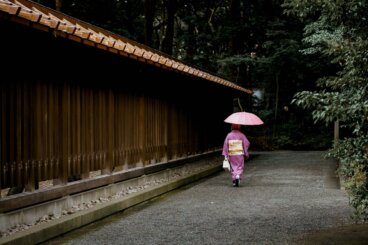If you’re visiting Japan and a little worried about the language barrier (or you simply love languages), we’ve got you covered with these essential Japanese phrases for travelers.
In our guide to what we believe are the most important Japanese phrases for travel, we’ll introduce you to a selection of key words and phrases — and explain why the Japanese language barrier is not as worrisome as you might think.
The truth is, you do not need to speak any Japanese to have a successful, wonderful trip to Japan (and if you’re looking for travel inspiration, check out our favorite destinations in Japan). However, learning a few key Japanese phrases can make your trip just that much better. So let’s get into it!
Download our Free Japanese Phrasebook:
Originally written in 2014, this post was updated and republished on November 1, 2019.
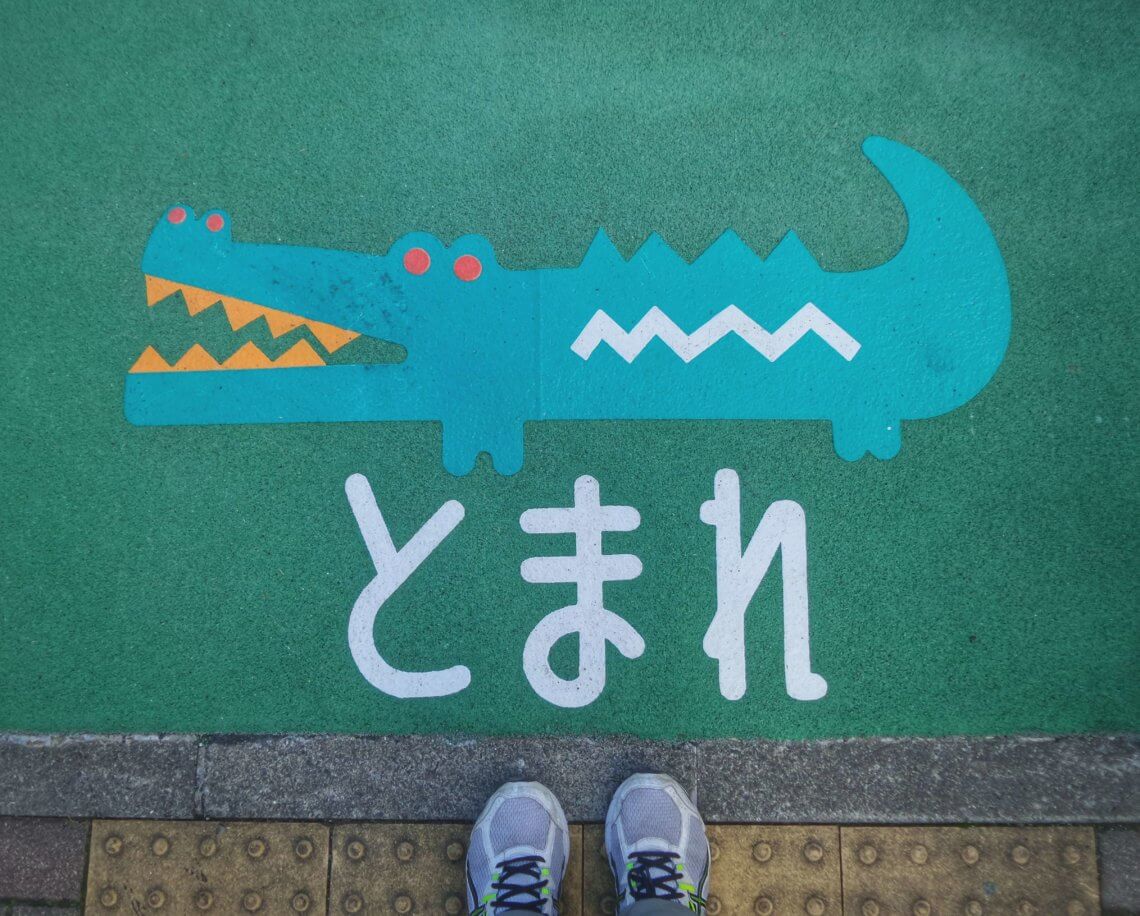
The Most Essential Japanese Words & Phrases for Your Trip to Japan
Learning Japanese can seem daunting, but don’t worry. You don’t need to learn any of these words or phrases to have a great time (see why we love Japan).
However, as any seasoned traveler knows, making a little linguistic effort can go a long way, and it can be helpful to learn even a little of the local language for your travels. We’ve narrowed it down to a small selection of key words and phrases, divided by category:
- The Basics: Key Japanese Words and Phrases
- Food and Drink: Eating Your Way Around Japan
- Now or Later: Time-Related Phrases in Japanese
- Getting Around Japan: Transportation-Related Phrases
Here is a quick look at the words and phrase you’ll find below:
Top 20 Essential Japanese Travel Phrases:
- Konnichiwa (こんにちは) – Hello
- Arigatou Gozaimasu (ありがとうございます) – Thank you
- Sumimasen (すみません) – Excuse me
- __ o Kudasai (__をください) – I would like __, please
- __ wa Doko Desu ka? (__はどこですか) – Where is __?
- Itadakimasu (いただきます) – An expression of gratitude for the meal you’re about to eat
- Omakase de (お任せで) – Used to order chef’s recommendation (often for sushi)
- O-sake (お酒) – General term for alcohol
- Nihonshu (日本酒) – Japanese sake
- Kinen Seki (禁煙席) – Non-smoking seat
- Ima Nanji Desu ka? (今何時ですか) – What time is it now?
- Nanji ni? (何時に?) – At what time?
- Asa (朝) – Morning
- Kyou (今日) – Today
- Ashita (明日) – Tomorrow
- __ ni Ikitai (__に行きたい) – I want to go to __
- Tomete Kudasai (止めてください) – Stop, please
- Kippu (切符) – Ticket
- Shinkansen (新幹線) – Bullet train
- Dono Densha? (どの電車?) – Which train?
If you’re concerned about memorizing all this Japanese, or want to learn even more words and phrases, download Boutique Japan’s Tiny Phrasebook for free.
And for an introduction to how to say these words and phrases, see our bonus video to help you practice your Japanese pronunciation.
Basic Japanese Words and Phrases
Let’s start with a few of the most basic-yet-essential Japanese words and phrases. Even if you only remember how to say hello or thank you, you’ll find that Japanese people will be appreciative of your efforts!
1. Konnichiwa (こんにちは) – Hello
Let’s start with one you’ve probably heard before: the word for hello is konnichiwa.
Konnichiwa is typically used during the day, and there are other phrases for good morning and good evening (ohayou gozaimasu, and konbanwa, respectively). But when you’re starting out it’s best to keep things simple, and if you simply learn konnichiwa you can use it throughout the day to say hello!
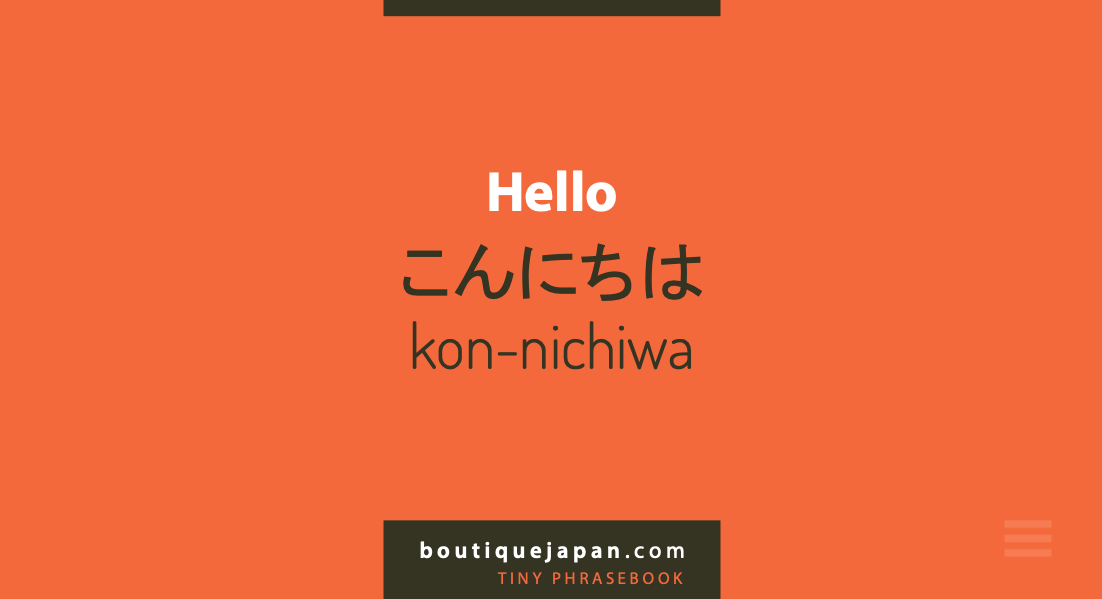
2. Arigatou Gozaimasu (ありがとうございます) – Thank you
In Japan, etiquette is no joke, and chances are you’ll be saying thank you a lot (learn more in our guide to Japanese etiquette).
The word for thank you in Japanese is arigatou gozaimasu (in Japanese, the u at the end of some words is barely pronounced to the point of being nearly silent). You can usually simply say arigatou, which is a little more casual but usually perfectly fine. In Japan, where politeness is such a key part of the culture, you’ll be saying arigatou gozaimasu a lot!
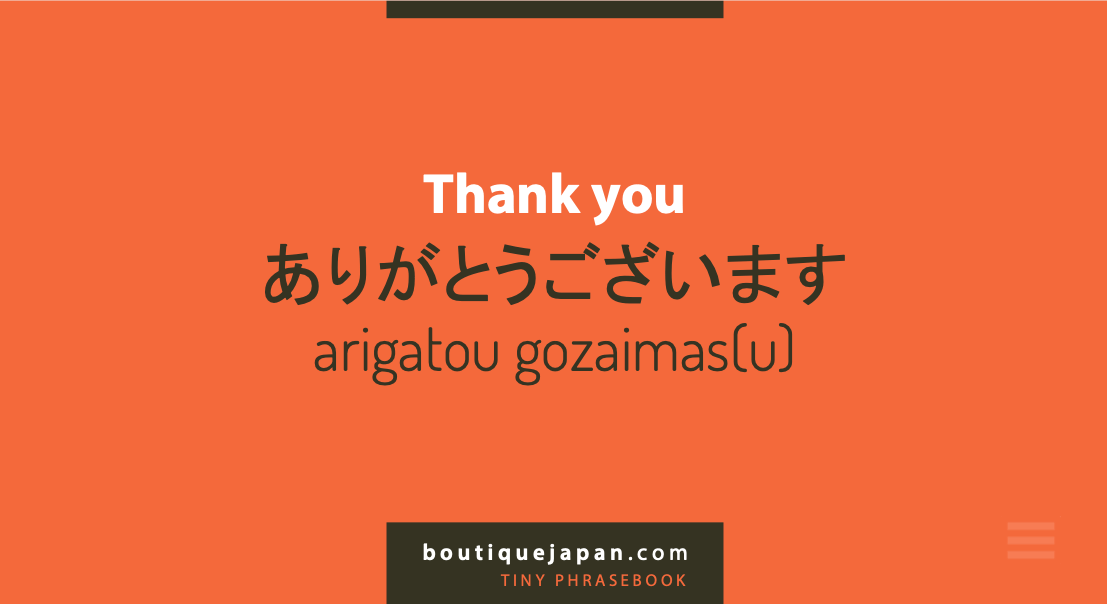
3. Sumimasen (すみません) – Excuse me
Excuse me is an important expression in any language, and Japanese is no exception.
The word for excuse me in Japanese is sumimasen. Chances are you’ll also be using this one quite a bit, so if you can try and memorize it! It’s a doubly useful word, as it can be used both to get a person’s attention, and also to apologize.
For example, use sumimasen at an izakaya (a Japanese-style gastropub) to get a waiter’s attention. At izakaya, it’s often called out as sumimaseeeeee~n! On the other hand, if you accidentally walk onto a tatami floor with your shoes on (something you’re likely to do at some point) you can use sumimasen to say I’m sorry.
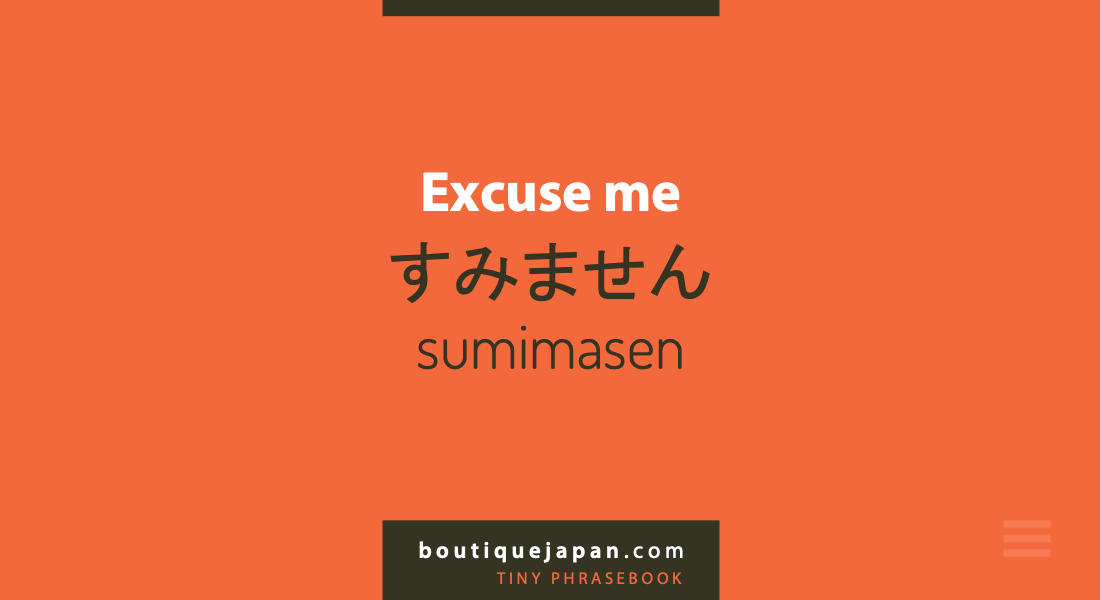
4. __ o Kudasai (をください) – I would like , please
Now that we’ve covered three basic essentials, we can move onto two key sentences that will hopefully help you a lot.
First is I would like __, please. This is useful in a variety of situations: at restaurants, in stores, and on many other occasions you’ll encounter while traveling. In Japanese, it’s __ o kudasai (simply fill in the __ [blank] with the item of your choice).
To get the most out of this phrase, you may want to learn a few vocabulary words, such as water (mizu), beer (biiru), sake, and others you think you may need.
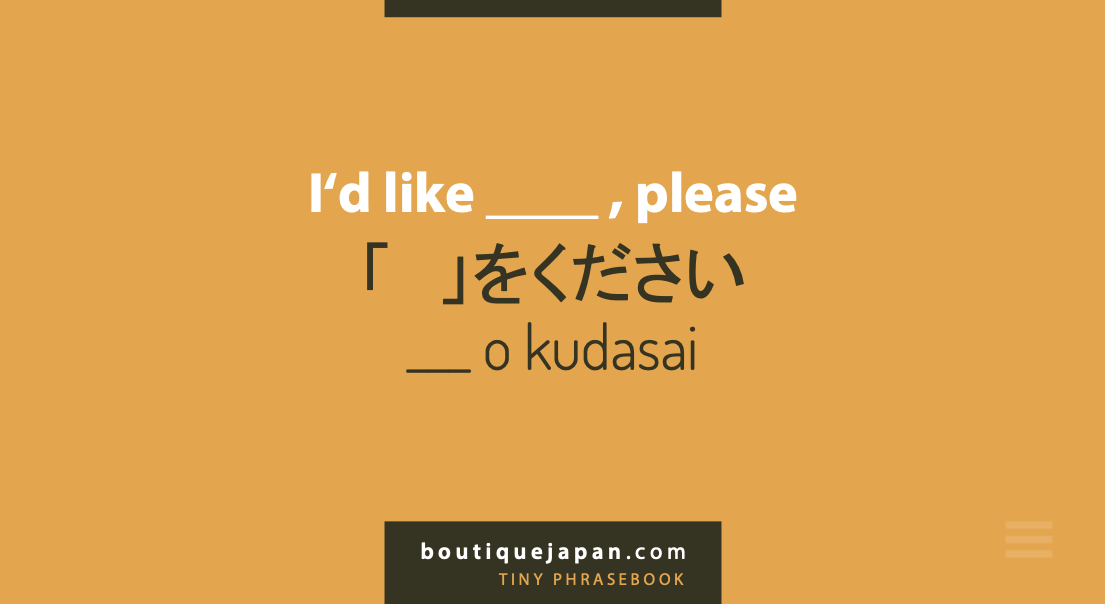
5. __ wa Doko Desu ka? (はどこですか) – Where is __?
Last but not least, we think it’s quite useful to be able to ask Where is the __? This is useful even if you can’t understand the answer, because once you ask, people will be able to point you in the right direction, or even help you get to where you’re going!
In Japanese, it’s __ wa doko desu ka? (simply fill in the __ [blank] with the place you’re trying to reach, such as the Ghibli Museum). One key vocabulary word that often goes along with this phrase for travelers is eki, which means station (for example, Shinjuku eki is Shinjuku station).
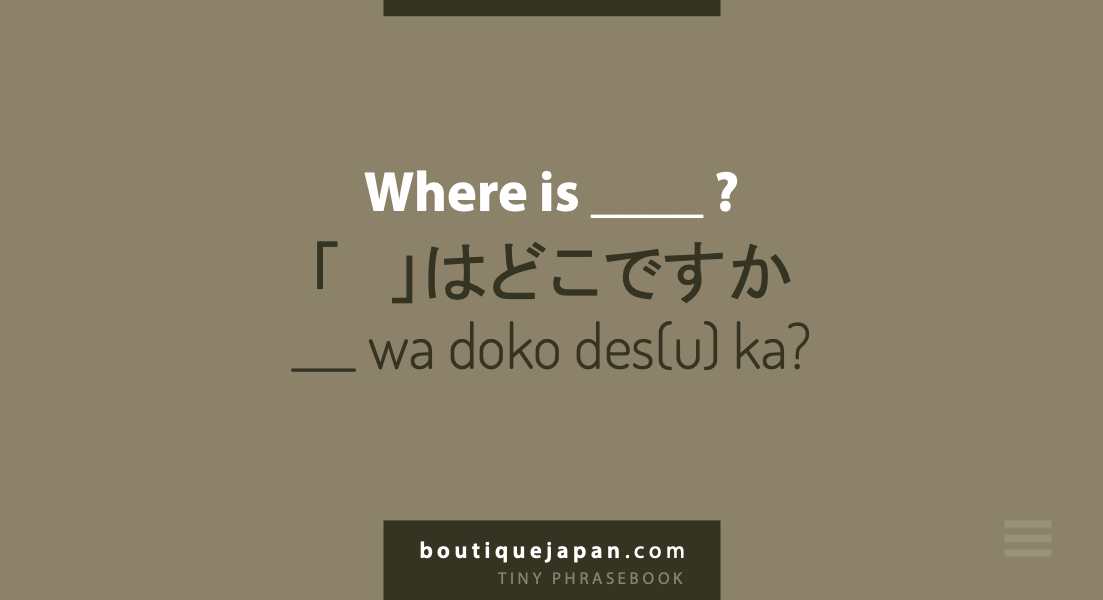
Eating Your Way Around Japan: Food and Drink Phrases
For many travelers, Japanese food is a top priority! From classic Tokyo sushi restaurants to the legendary food culture of Okinawa, there’s a lot to take in. For alcohol afficionados, Japan also offers sake, Japanese whisky, shochu, and other traditional beverages.
While you don’t need to speak any Japanese to enjoy eating and drinking in Japan, these key words and phrases will help you make the most of your culinary experiences.
6. Itadakimasu (いただきます) – An expression of gratitude for the meal you’re about to eat
Certainly not required, but if you say itadakimasu before you begin eating, whether in a restaurant or at a person’s home, they will surely be impressed with your manners.
Essentially, this phrase expresses humility and thanks for the meal you are about to enjoy. The website Tofugu does a very nice job of explaining the meaning of itadakimasu.

7. Omakase de (お任せで) – Used to order chef’s recommendation (often for sushi)
If you’re a passionate sushi enthusiast, you probably already know the meaning of omakase.
When you tell a chef omakase de, you’re letting them know that you’re placing the meal in their hands. Especially for travelers with adventurous palates, this is the best way to experience a meal at a Tokyo sushi shop, for example.
However, the phrase is not only used at sushi restaurants, and can often be used at other types of establishments as well.

8. O-sake (お酒) – General term for alcohol
Technically osake, this word has tripped many a non-Japanese speaker up! While in English the word sake means, well, sake, in Japanese the word sake — more politely, osake — refers to alcoholic beverages in general.
(Sake and osake are virtually interchangeable; the “o” is what is known as an honorific prefix, but unless you’re studying Japanese in more depth, you really don’t need to worry about this!)
So if you’re looking for sake (which in Japanese is called nihonshu), it’s best to ask for nihonshu (see below). If you’re simply looking for an adult beverage (such as nihonshu, shochu, or Japanese whisky), the catchall term sake will do the trick.

9. Nihonshu (日本酒) – Japanese sake
See above for the distinction between sake and nihonshu!
10. Kinen Seki (禁煙席) – Non-smoking seat
Encountering cigarette smoke is somewhat of an unavoidable aspect of traveling around Japan. This being said, most of our travelers are quite averse to smoke, and fortunately it’s possible to travel around Japan without smoke becoming too much of a nuisance.
In some places, such as restaurants, you may have a choice between the smoking and non-smoking sections. Kinen means non-smoking, and seki means seat: put them together and you’ve just conveyed that you’d like to be seated in the non-smoking area!

Time-Related Phrases in Japanese
Time-related phrases can be extremely helpful in certain travel situations, and below you’ll find a few of the most practical Japanese words and phrases on this topic.
11. Ima Nanji Desu ka? (今何時ですか) – What time is it now?
Chances are you’ll have a watch or cell phone on you, but once in a while you may need to ask a stranger for the time.
The basic phrase is simply nanji desu ka? which means, What time is it? People also commonly say ima nanji desu ka? which simply means, What time is it now? (Ima means now.)

12. Nanji ni? (何時に?) – At what time?
This is a particularly useful phrase while traveling. It can be helpful when purchasing rail tickets (see more on getting around Japan below), making meal reservations, or arranging tickets to events.
Sure, you could just ask nanji? (what time?) and hope your point gets across, but by adding the preposition ni you can be assured of much more clarity!
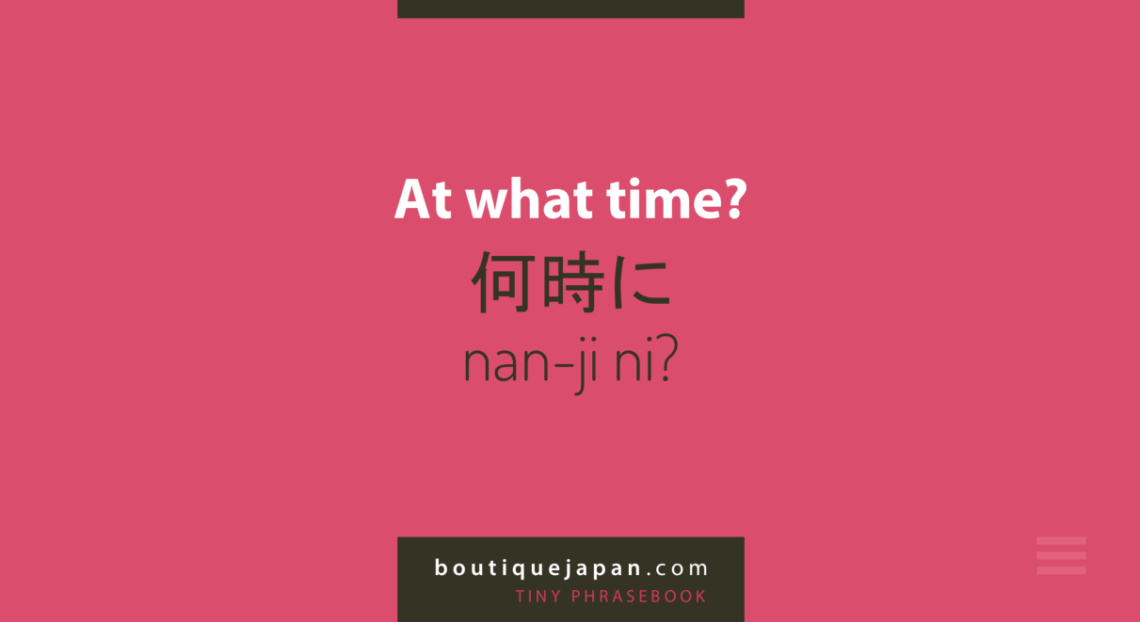
13. Asa (朝) – Morning
This one is fairly self-explanatory: asa means morning. While it’s no surprise that a food-loving culture like Japan has multiple words for breakfast, one of the most common is asagohan (gohan literally means rice, but is more generally used to mean food).

14. Kyou (今日) – Today
Words like today and tomorrow can be particularly useful when buying train tickets, for example. For more on transport, see the transport-related phrases below.

15. Ashita (明日) – Tomorrow
When pronouncing the word for tomorrow, ashita, the i is virtually silent, so it ends up sounding more like ashta. If you need to express the day after tomorrow, the word is asatte.

Getting Around Japan: Transportation-Related Phrases for Travelers to Japan
For some travelers, one of the biggest concerns about not speaking the language is the prospect of getting around the country, navigating the trains, and trying to avoid getting lost.
Fortunately, Japan has an incredibly efficient and easy-to-use rail network, and you can read all about it in our guide to train travel and getting around Japan. And here are some key Japanese words and phrases to help you on your way.
16. __ ni Ikitai (に行きたい) – I want to go to __
On its own, ikitai means, I want to go.
To express that you’d like to go somewhere, use the phrase __ ni ikitai (simply fill in the __ [blank] with the place you’re trying to reach). For example, Kyoto ni ikitai means, I want to go to Kyoto.

17. Tomete Kudasai (止めてください) – Stop, please
Tomete means stop, and is particularly useful in taxis. The kudasai here means please, and makes the phrase much more polite (tomete on its own would come off as quite brusque).

18. Kippu (切符) – Ticket
Kippu means ticket (as in train tickets). As you can easily imagine, when purchasing rail tickets it can be very useful to be able to tell the ticket agent that you’d like a ticket to a certain place!
Made means until or to (in this case, to your destination). For example, Osaka made means to Osaka. Thus, Osaka made no kippu means ticket to Osaka. Put it all together with kudasai (for politeness) and you have Osaka made no kippu o kudasai.

19. Shinkansen (新幹線) – Bullet train
Ah, the shinkansen. One of the utter joys of traveling around Japan is the world-famous shinkansen (bullet train).
Whether you have the well-known Japan Rail Pass or not, if you’re doing any domestic travel within Japan, chances are you’ll end up on the incredible (and incredibly pleasant) shinkansen for at least one if not more of your journeys. Enjoy, and grab a bento and some nihonshu (see above) for the ride!

20. Dono Densha? (どの電車?) – Which train?
Wondering which train you need? Imagine you’re in Kyoto Station, headed for Tokyo. You’re on your shinkansen’s departure platform, but you see two trains.
You show your ticket to a friendly Japanese person, and ask, dono densha? They take a look at your ticket and the two trains, and point you to the right one. And you’re on your way – happy travels!

Download our Free Japanese Phrasebook PDF
For those of you who want to learn even more Japanese for travel, we’ve created the Boutique Japan Tiny Phrasebook.
Our Tiny Phrasebook features carefully selected Japanese words and phrases designed to help you get the most out of your trip to Japan. You’ll find all of the words and phrases featured above, and many more!
The phrasebook is a beautifully designed PDF (it may take a few moments to load depending on your internet speed).
Simply save it to your smartphone, tablet, or computer. We suggest using an app like iBooks (or another PDF reader) so you can search for words and navigate easily.
Bonus Video: Practice your Japanese Pronunciation
One of the best things about Japanese is that it’s surprisingly easy to pronounce. Unlike several other languages throughout Asia, Japanese is not a tonal language.
In the video below, we go over basic pronunciation for some of the most useful Japanese words and phrases for your trip to Japan.
Do you need to speak any Japanese to travel around Japan?
Absolutely not. You can travel to Japan without learning any of these words and have a great time.
People ask us about the Japanese language barrier all the time, with common questions such as, Do Japanese people speak English? How much (or how little)? The language barrier is a common myth that shouldn’t get in your way. Most of our travelers don’t speak a single word of Japanese, yet come back with testimonials of how much they love Japan.
The truth is that most Japanese people speak at least a little bit of English. These days, all Japanese students study English for a minimum of six years in secondary school, and many students — as well as adults — also take English-language classes after school or on weekends.
English-language fluency is not widespread, so most people you meet probably won’t be fluent in English, but almost everyone you meet will know at least a few English words – and many will know anywhere from hundreds to thousands.
Sometimes you may find that the people you meet are hesitant to try their English on you, but you’ll likely find that you can communicate in basic English in a huge variety of situations while traveling around Japan.
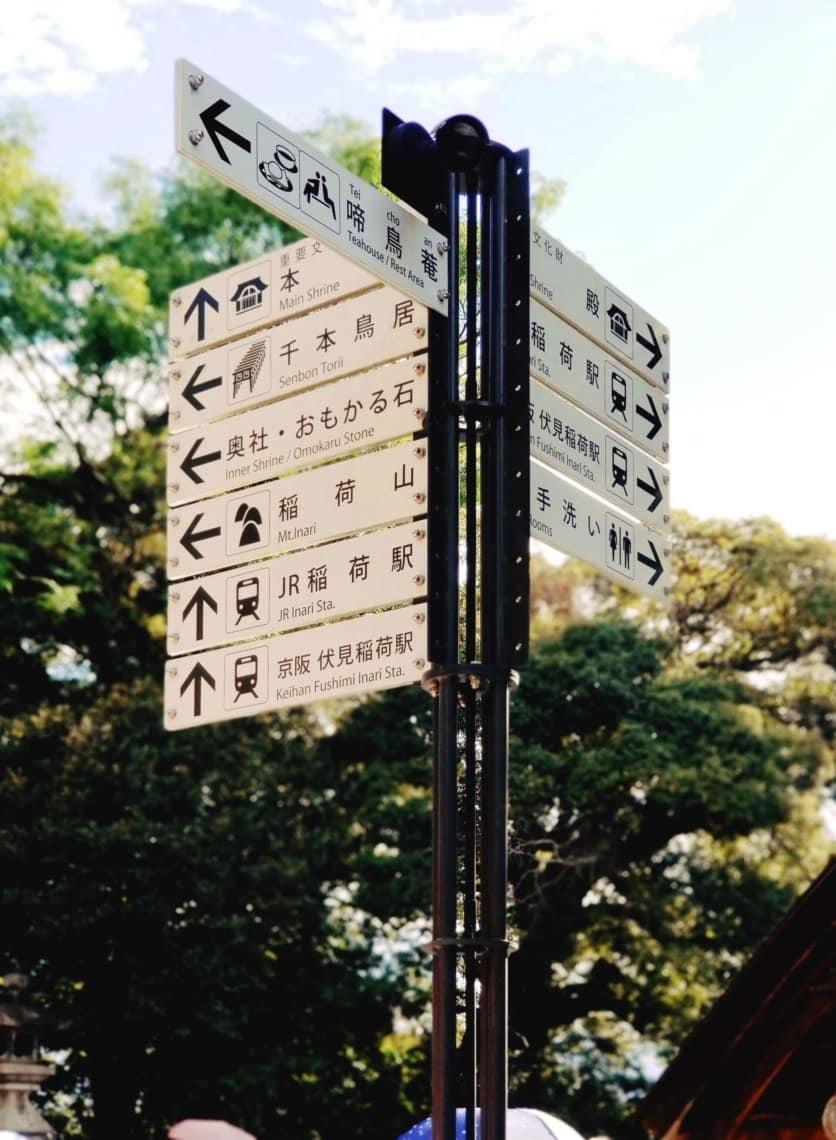
The Japanese Written Language
You may also be worried about the written language. The good news is that you don’t need to be able to read or write Japanese to enjoy Japan.
Japanese people don’t expect you to be able to read the Japanese language, and you’ll find English-language signage throughout the country. This is especially true in places frequented by travelers, such as sightseeing spots, shopping areas, train stations, airports, and often even on the street.
As for at restaurants, though it’s not always the case, in some cases you will find English-language menus. When English-language menus are not available, photos are often included to make pointing and ordering possible.
Despite Japan’s travel-friendliness, every visitor to Japan at some point finds him or herself in a situation in which linguistic communication is simply not possible, and sign language and gesturing are required.
Getting lost in a foreign country where you don’t speak the language is a fear of many would-be travelers, but if you had to pick a country in which to get lost, you couldn’t do much better than Japan! Japan is by far one of the safest countries in the world, with crime rates that are astonishingly low compared to places like the US and most of Europe. And Japanese people will often go to surprising lengths to help tourists.
Back when I first moved to Japan I spoke very little Japanese, and on my first visit to Kyoto I accidentally took the wrong train and ended up wandering around a neighborhood with no idea how to get where I wanted to go. Luckily, an older gentleman with his wife spotted me looking confused and came up to me with perhaps one of the only English phrases he knew: “Are you lost?” I said yes and showed him the name of the place I wanted to go.
If he had simply pointed me in the right direction it would have been helpful, but instead he started walking me in the right direction. After a few minutes of walking his wife split off, presumably to go home, and we continued. After 15 minutes of walking he had dropped me off at exactly the spot I needed to be, and – as is typical in Japanese culture – expected nothing in return. I thanked him profusely and we had a good laugh despite our inability to communicate linguistically.
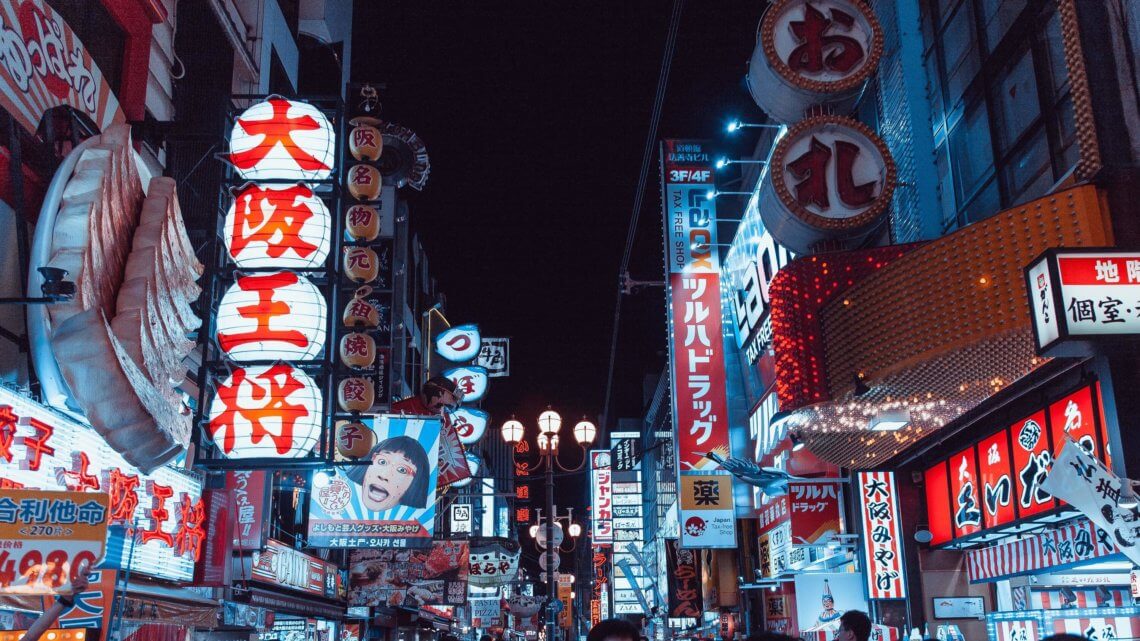
Why Learn Any Japanese if You Won’t Need it?
Almost everyone who has visited Japan has a similar story of a random act of kindness and generosity from a Japanese stranger (or a tale of a camera or passport left on a train being miraculously returned). So you can rest assured that even if you forget all of the words and phrases we’ve shown, you’ll be in good hands with the wonderful people of Japan.
But aside from the fact that it’s a rich and fascinating language, learning even just one or two Japanese words or phrases will help endear you to the Japanese people you meet during your trip, and enhance your overall travel experience.
Japanese people tend to be extremely appreciative of visitors who take the time to learn even just a word or phrase or two, and if you try then chances are you’ll be greeted with oohs and aahs of encouragement.
We hope you’ve found our guide to Japanese words and phrases for travelers helpful. Arigatou gozaimasu!


